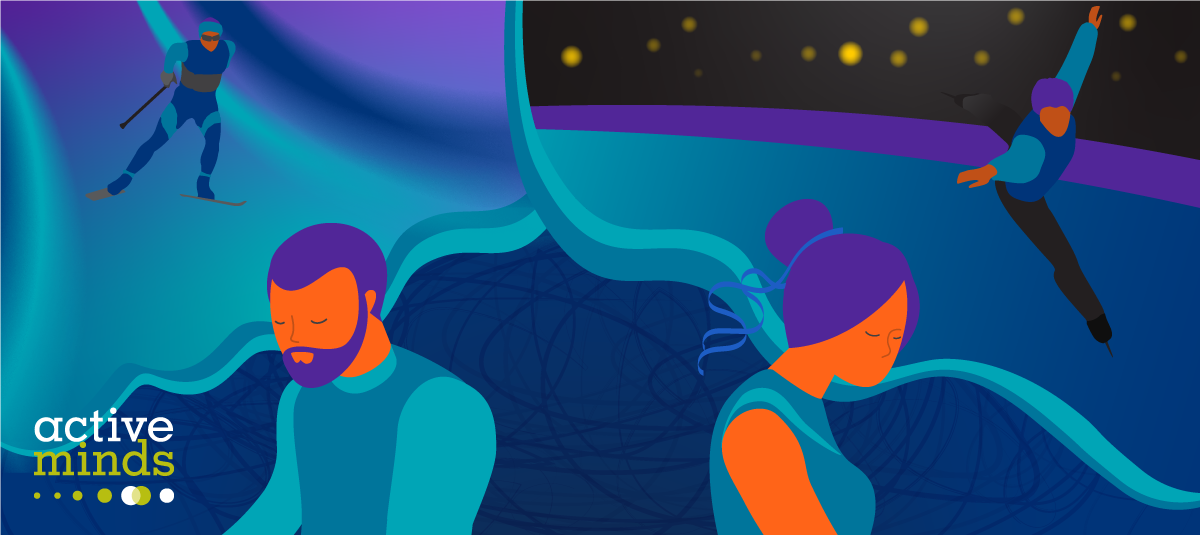In February of 2010, when the Winter Olympics were being hosted in Vancouver, Canada, my high school social studies teacher approached me. “Markie, I was watching figure skating last night, and you are the only figure skater I know. I have to ask… How do skaters get to the Olympics after training for years, doing the same program over and over again, and then fall?”
I had asked that question many times myself. How did I practice for hours and hours, the same program for a year or even two, only to get to a competition and fall? I didn’t have the full answer, but I told him what I knew. “It’s a mental game,” I replied. “It comes down to what is going on inside your head the day of the competition and the moment you jump.”
The day of a figure skating competition is busy for most skaters: warming up, doing makeup and hair, and of course eating good meals. However, for a figure skater living with clinical obsessive-compulsive disorder, like myself, the schedule was even more packed because it included rituals. In addition to stretching with my peers, I was doing things like tying and untying my skates three times before getting on the ice and doing exactly fifty-four jumping jacks and fifty-four sit-ups during a warm-up. Not only did OCD create more items on my agenda, but it also made my daily schedule very rigid. I had to do my hair before my make-up. I had to spin in a specific spot on the ice during the warm-up session. All of these rituals had the same consequence: if I did not complete the ritual, I would fall. So if someone else was spinning in that specific spot, my OCD told me it was certain I was going to fall while performing no matter what. Because of my mental disorder, over the years my skating became less about what was happening on the ice and more about what rituals I was completing before my performance. So to answer my teacher’s question, in my case, I fell on the day of competitions because if everything wasn’t just perfect before taking off for my double salchow, a voice would tell me, “You are going to fall.” And when that is your last thought before jumping, good luck landing.
The pressure we face in sports, or in any competition, can affect our mental health, no matter how much we train, how many times we compete, or how hard we try to push the thoughts out of our heads.
Few know this truth better than Olympic athletes. At the Summer Olympics in 2021, gymnast Simone Biles bravely brought to light the mental health issues that can occur as a result of the pressure of competition, or at least be exacerbated by it. Back in 2018, figure skater Gracie Gold withdrew from the Olympics to get treatment for her eating disorder, depression, and anxiety. Now, for the first time, at the 2022 Winter Olympics in Beijing, there will be full-time sports psychologists available to all athletes. Athletes will be given opportunities for individual counseling, participating in group therapy, and access to crisis hotlines. This is a large step for not only the Olympics but also mental health awareness as a whole. I hope that this increased access to care for athletes starts a trend in decreasing the stigma around mental health in sports generally. This trickle-down effect from the Olympics has the potential to create a new mental health culture in countries around the world.
Sometimes it is easy to forget that athletes have lives outside of their sport. Simone Biles is more than a gymnast, and Gracie Gold is more than a figure skater. Growing up, OCD affected all arenas of my life, but my disorder was most pronounced when I was skating because of the high-pressure situations the sport put me in. I was formally diagnosed with OCD at age 17, but my rituals began at age seven. If I would have had a sports psychologist to work with, maybe somewhere in the span of those ten years someone would have caught what I was going through. Relief would have been offered and my life would not have only changed on the ice, but more importantly off of it.




